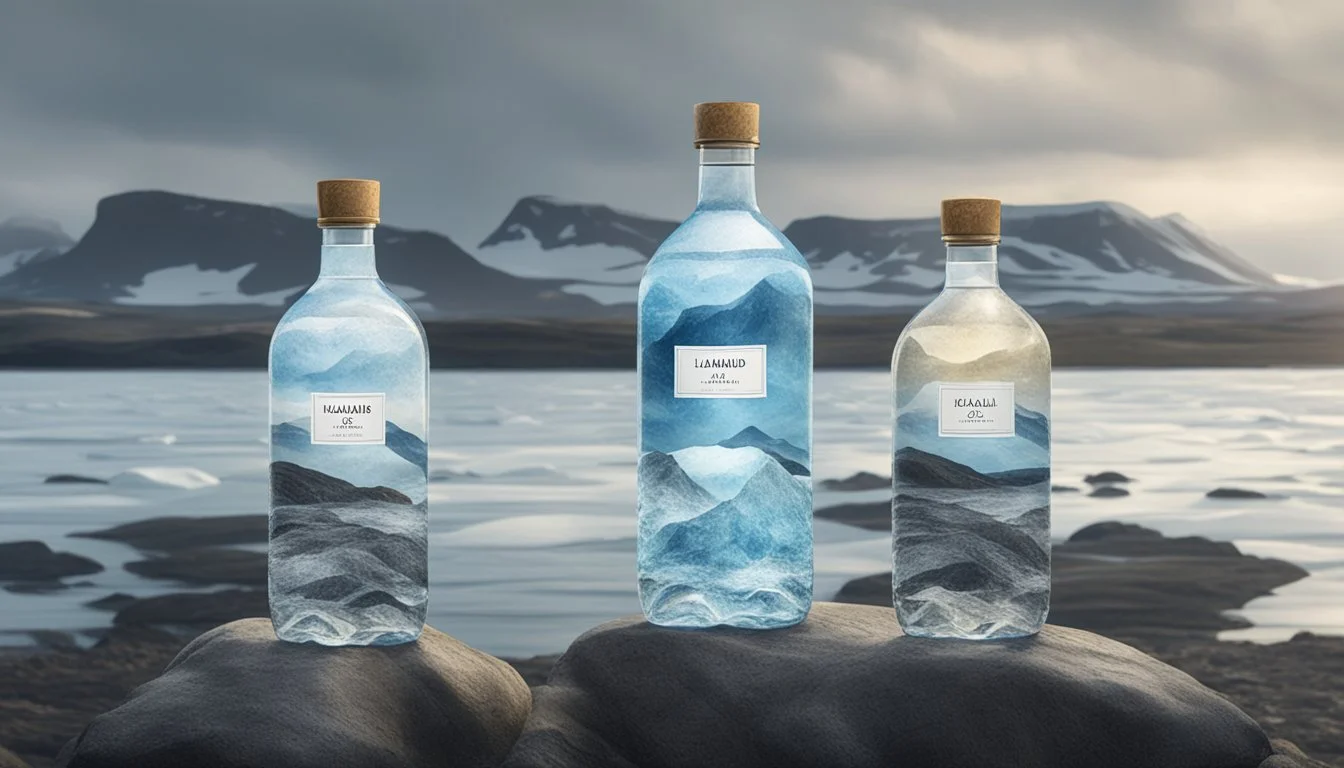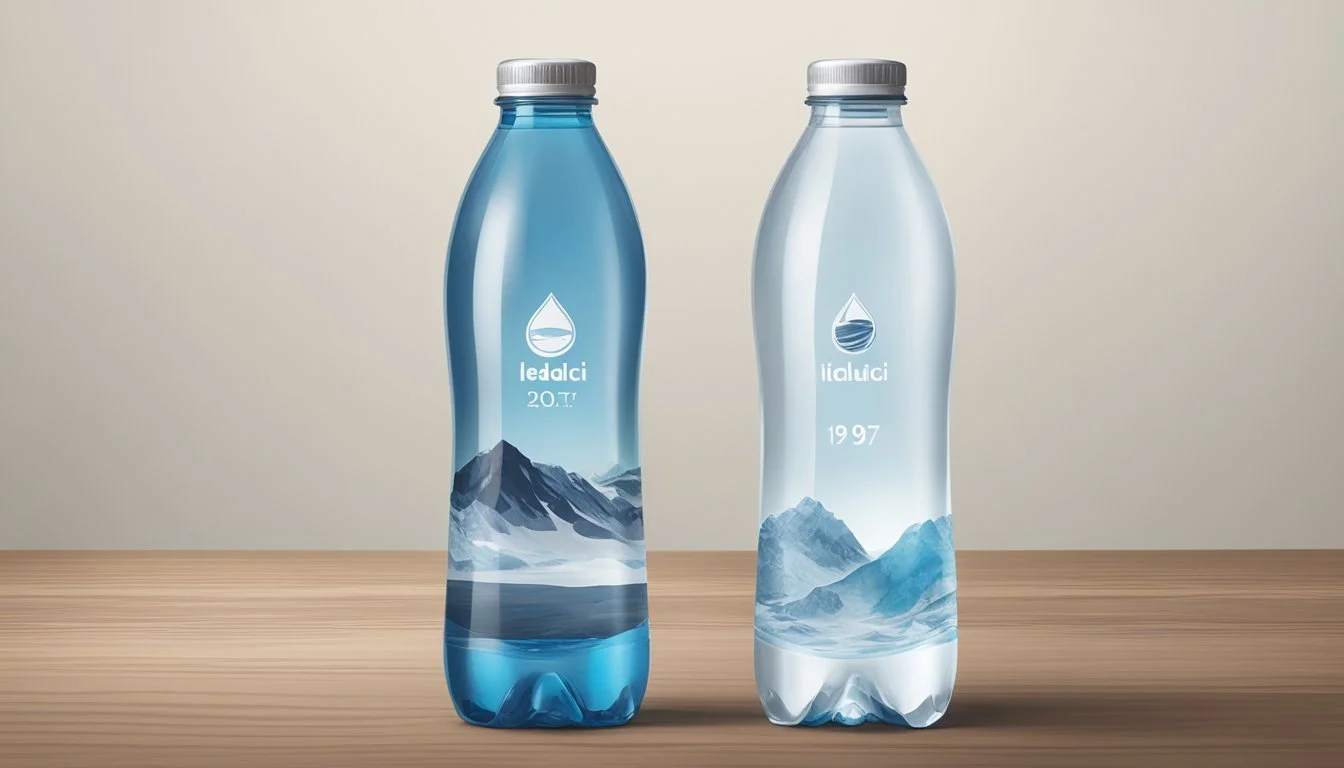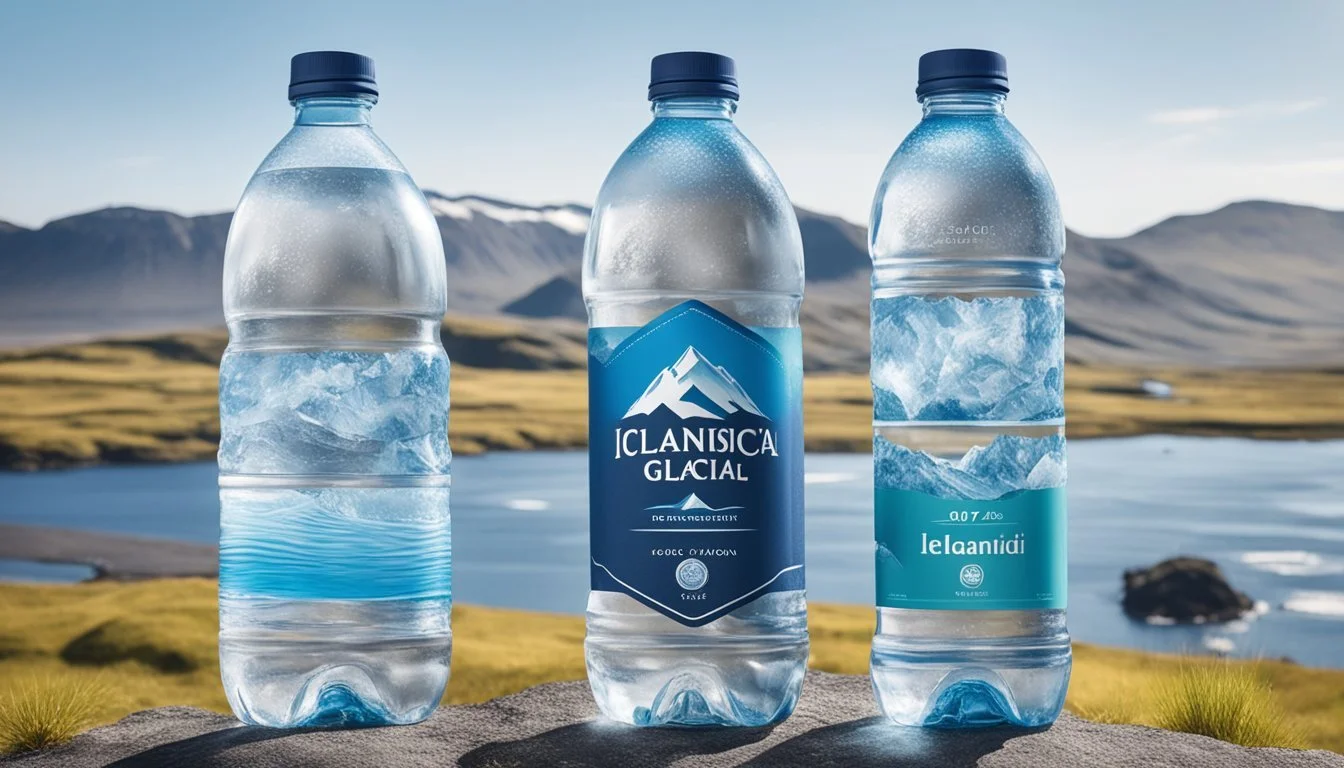Icelandic Glacial vs. 1907water
Comparing Premium Bottled Waters
Choosing the right bottled water can significantly impact both health and hydration. In a crowded market, Icelandic Glacial and 1907water stand out, known for their purity and natural properties. Icelandic Glacial, sourced from the Ölfus Spring in Iceland, boasts a high pH and is renowned for its unique mineral content and sustainability. On the other hand, 1907water, hailing from New Zealand, is favored for its pristine quality and naturally alkaline properties.
For those prioritizing mineral content and environmental responsibility, Icelandic Glacial emerges as a top choice. Its water is not only pure and balanced but also sustainably sourced and bottled in recyclable materials. 1907water also maintains high standards of purity and alkalinity, making it a strong contender for those focused on natural hydration.
Ultimately, the decision between Icelandic Glacial and 1907water depends on individual preferences. Whether seeking the unique minerals of Iceland or the natural alkalinity of New Zealand's waters, both options provide excellent hydration choices.
Overview of Bottled Water Industry
The bottled water industry is a massive global market, continually growing over the past decades. Global sales from 109 countries grew 73% between 2010 and 2020, highlighting its rapid expansion.
Numerous well-known brands dominate the market, such as Nestlé's Pure Life, Poland Spring, Dasani, and Aquafina. Each brand offers different types of bottled water, including spring water, mineral water, and purified water.
Premium brands like Evian and Fiji cater to consumers seeking higher-end options. Icelandic Glacial and Core Hydration are also notable for their focus on purity and premium taste.
Bottled water packaging varies widely:
Glass bottles
Plastic bottles
Boxed water
Sustainability is becoming increasingly crucial. Brands like Boxed Water and Icelandic Glacial, known for its certified CarbonNeutral operations, emphasize eco-friendly practices.
Consumers value transparency in water source and purification methods. However, many brands tend to lack detailed disclosure, as pointed out by reports from organizations like the Environmental Working Group (EWG).
Some established brands:
Deer Park
Arrowhead
Crystal Geyser
Spring water, like Poland Spring, comes from natural springs. Purified water, such as Aquafina and Dasani, goes through extensive purification processes to ensure quality.
The industry thrives on brand trust, quality perceptions, and responsive marketing to consumer preferences for healthy and convenient hydration options. The competition among established and niche players remains fierce.
Understanding Water Quality
When evaluating the quality of bottled water, several factors must be taken into account. These include pH levels, mineral content, total dissolved solids (TDS), and rigorous testing as endorsed by quality reports. Each of these factors plays a crucial role in determining the overall health benefits and safety of the water.
pH Level and Its Importance
The acidity or alkalinity of water is measured using the pH scale. A balanced pH is essential for maintaining good health. Icelandic Glacial Water boasts a natural pH of 8.4, making it alkaline and potentially beneficial for neutralizing stomach acid and improving overall hydration.
Comparatively, 1907water also promotes its alkaline properties, though specific pH values may vary. Waters with higher pH levels are often preferred for their purported health benefits, including better bone health and muscle function.
Mineral Content and Health Benefits
Mineral content in water can provide significant health benefits. Icelandic Glacial Water contains beneficial minerals like calcium and magnesium, which contribute to bone health and muscle function. Calcium is essential for strong bones and teeth, while magnesium supports muscle and nerve function.
1907water similarly contains natural minerals, enhancing its health profile. Consumers should check mineral content as indicated on water labels, considering factors like daily nutritional needs and specific health goals.
Total Dissolved Solids (TDS)
Total Dissolved Solids (TDS) measure the combined content of all inorganic and organic substances in the water. A higher TDS often indicates the presence of beneficial minerals, but excessively high TDS might suggest contamination.
Icelandic Glacial typically features a medium TDS, indicating balanced mineral content without excess. 1907water’s TDS varies, but like Icelandic Glacial, it is subject to strict quality controls ensuring safe levels. Consumers often use TDS as a quick reference for water quality and purity.
Testing and Quality Reports
Quality assurance in bottled water comes from rigorous testing and adherence to standards set by authorities like the FDA and World Health Organization. Both Icelandic Glacial and 1907water undergo extensive testing to meet these regulatory requirements.
Water quality reports provide transparency, detailing each brand’s compliance with safety standards. Consumers are encouraged to review these reports to make informed decisions, ensuring the water they consume meets high safety and quality standards.
Environmental Considerations
Both Icelandic Glacial and 1907water are recognized for their emphasis on environmental sustainability. Key points to consider include the source's sustainability, the packaging's recyclability, and the overall carbon footprint and ecological impact associated with each brand.
Source Sustainability
Icelandic Glacial water is sourced from Iceland's Ölfus Spring, a naturally replenished spring providing an abundant supply. This ensures a sustainable and consistent extraction process without depleting natural resources.
1907water, on the other hand, sources its spring water from a deep aquifer in New Zealand. The brand promotes sustainable extraction methods, ensuring minimal disturbance to the environment. Both brands emphasize the purity and sustainability of their sources, crucial for maintaining environmental balance.
Packaging and Recycling
Icelandic Glacial uses 100% recyclable PET bottles for its packaging, contributing significantly to reducing plastic pollution. They also produce bottles made from recycled materials, following stringent environmental regulations to minimize waste.
1907water also takes a strong stance on eco-friendly packaging. They offer glass bottles and PET plastic containers, both of which are recyclable. Their commitment to using environmentally friendly materials and promoting recycling helps cut down on the presence of plastic particles in the environment.
Carbon Footprint and Ecological Impact
Icelandic Glacial is certified as a carbon-neutral product, using renewable energy sources and implementing measures to offset its carbon emissions. The brand's focus on reducing its carbon footprint reflects its commitment to mitigating climate change's impacts.
1907water adopts similar practices by employing renewable energy in its bottling operations. They aim to lower their carbon footprint by optimizing transport logistics and using local resources efficiently. Both brands' strategies for reducing carbon emissions demonstrate a concerted effort to lessen their ecological impact and promote a sustainable future.
A Closer Look at Icelandic Glacial Water
Icelandic Glacial Water stands out for its pure source, natural filtration, and strong market presence. We explore its origins, the unique natural filtering process, and how the brand positions itself.
The Ölfus Spring Source
Icelandic Glacial Water is sourced from the legendary Ölfus Spring in Iceland, one of the world’s largest natural springs. This spring is constantly replenished by the gradual filtration of abundant rainfall and snowmelt in the region.
Ensuring sustainability, the spring’s flow exceeds 900,000 cubic meters of water annually. The water's unique pathway through geological formations imparts distinct characteristics and a naturally high pH level, enhancing its appeal.
Purity and Natural Filtration
The water’s purity and high mineral content are attributed to its natural filtration through layers of volcanic rock. This process removes impurities while retaining essential minerals, resulting in water with a pH level of 8.4.
The gradual filtration ensures a high level of cleanliness, distinguishing it from many bottled waters that undergo chemical treatments. Icelandic Glacial promotes itself as offering one of the cleanest and purest bottled waters available due to this natural process.
Branding and Market Position
Icelandic Glacial markets itself as the world's first CarbonNeutral Certified bottled water, highlighting its commitment to sustainability. The brand’s labeling underscores the water’s natural and pure origins from the Ölfus Spring.
Icelandic Glacial holds exclusive commercial rights to bottle water from this source, setting it apart in a crowded market. Notably, the brand leverages its Icelandic heritage and the purity of its water to appeal to health-conscious consumers seeking high-quality bottled water.
Comparative Analysis
Icelandic Glacial and 1907water both offer unique qualities in taste, mineral content, pH levels, pricing, and reputation. This section provides a detailed comparison of these two bottled water brands to help consumers make an informed choice.
Taste Profiles
Icelandic Glacial water is sourced from Icelandic springs, claiming a crisp and clean taste with a balanced mineral profile. The purity and smoothness are often highlighted by consumers.
1907water, sourced from New Zealand, is known for its silky mouthfeel and natural taste. Its minimal processing ensures the flavor remains untainted, appealing to those who prefer a more neutral taste profile.
Comparing pH and Mineral Levels
Icelandic Glacial boasts a slightly alkaline pH level of 8.4, contributing to its perceived health benefits. Its mineral content includes calcium, magnesium, and potassium, which can aid in hydration and overall well-being.
1907water, with a pH of 7.8, also leans towards alkalinity. It contains essential minerals like silica, magnesium, and calcium, which may support bone and skin health. Comparing both brands, Icelandic Glacial's higher pH is a notable differentiation.
Brand pH Level Key Minerals Icelandic Glacial 8.4 Calcium, Magnesium, Potassium 1907water 7.8 Silica, Magnesium, Calcium
Price and Accessibility
Icelandic Glacial is often priced higher in the market due to its imported status and environmental branding. It positions itself as a premium option, reflected in its cost.
1907water, while also imported, tends to be slightly more affordable within the premium water category. Both brands are available in specialty and health food stores but may not be as widely accessible as more common brands.
Brand Reputation and Awards
Icelandic Glacial has built a strong reputation for its commitment to sustainability and environmental efforts. It has received awards for its eco-friendly practices and high-quality standards.
1907water, though less prominent, is gaining recognition for its purity and natural sourcing. Its reputation is bolstered by accolades from water tasting competitions, underscoring its quality.
Both brands are respected, but Icelandic Glacial's marketing and environmental focus give it a slight edge in public perception.
Consumer Insights
Consumers often look for specific attributes in bottled water, focusing on taste, safety, and convenience. This section explores the preferences and concerns consumers express when choosing between Icelandic Glacial and 1907water.
Customer Preferences
Customers often prioritize taste and purity when selecting bottled water. Icelandic Glacial, sourced from the Olfusa spring in Iceland, is praised for its crisp and refreshing flavor, filtered naturally through volcanic rock.
In contrast, 1907water, originating from a New Zealand aquifer, is also valued for a smooth taste with balanced minerals. Convenience is another key factor, and consumers appreciate easy accessibility both in physical stores and online platforms.
Icelandic Glacial is often praised for its stylish packaging, which adds an element of elegance to its appeal.
1907water tends to attract consumers looking for a distinct, smooth flavor. Both brands have built loyal followings who appreciate the unique characteristics each water type offers.
Trust and Safety Concerns
Safety and trust are paramount when choosing bottled water. Consumers are becoming increasingly aware of contaminants like microplastics and seek transparency from brands. Icelandic Glacial and 1907water both emphasize bottling at the source to minimize contamination risks.
Icelandic Glacial boasts stringent purity standards, ensuring minimal contaminants and balanced mineral content. This commitment to quality reassures consumers worried about potential health implications.
1907water also highlights its pure source and strict safety protocols, giving users confidence in its product. With rising concerns about tap water safety, consumers trust bottled water brands that prioritize stringent safety measures and transparency regarding their water source and quality testing.
These brands meet the demand for safe, high-quality drinking water by openly providing detailed information about their sourcing and bottling processes.
Regulatory and Quality Certifications
Both Icelandic Glacial and 1907water emphasize adherence to strict regulatory and quality standards.
Icelandic Glacial is notable for being the world's first carbon-neutral certified bottled water brand. This includes certification for both its product and operations, highlighting its commitment to sustainability.
1907water also upholds stringent quality standards. Like Icelandic Glacial, it complies with FDA and EPA regulations, ensuring that all aspects of its production meet stringent safety criteria.
Icelandic Glacial sources water from Ölfus Spring, a sustainable and renewable source. The brand's facility operates entirely on geothermal and hydroelectric power, showcasing a strong commitment to environmental practices.
1907water sources its water from a pristine aquifer in New Zealand, ensuring high purity and mineral content. Their facility employs advanced filtration and bottling processes to maintain these standards.
Both brands prioritize quality and safety. Icelandic Glacial's quality control includes rigorous testing that meets or exceeds global water standards. Similarly, 1907water performs comprehensive testing to ensure every bottle maintains its purity and mineral balance.
In summary, both brands meet critical regulatory and quality certifications, prioritizing safety, environmental responsibility, and stringent quality controls throughout their operations.
More About Icelandic Glacial
Acqua Panna vs Icelandic Glacial: Which Bottled Water is Better?
Aquafina vs Icelandic Glacial: Which Bottled Water is Better?
Arrowhead vs Icelandic Glacial: Which Bottled Water is Better?
Boxed Water vs Icelandic Glacial: Which Bottled Water is Better?
Core Hydration vs Icelandic Glacial: Which Bottled Water is Better?
Deer Park vs Icelandic Glacial: Which Bottled Water is Better?
Essentia vs Icelandic Glacial: Which Bottled Water is Better?
Eternal vs Icelandic Glacial: Which Bottled Water is Better?
Ice Mountain vs Icelandic Glacial: Which Bottled Water is Better?
Icelandic Glacial vs 7-Select: Which Bottled Water is Better?
Icelandic Glacial vs Alkaline88: Which Bottled Water is Better?
Icelandic Glacial vs Antipodes: Which Bottled Water is Better?
Icelandic Glacial vs Aqua Carpatica: Which Bottled Water is Better?
Icelandic Glacial vs Big Chill: Which Bottled Water is Better?
Icelandic Glacial vs Big Win: Which Bottled Water is Better?
Icelandic Glacial vs BodyArmor: Which Bottled Water is Better?
Icelandic Glacial vs Cascade Mountain: Which Bottled Water is Better?
Icelandic Glacial vs Castle Rock: Which Bottled Water is Better?
Icelandic Glacial vs CBD Living: Which Bottled Water is Better?
Icelandic Glacial vs Crystal Geyser: Which Bottled Water is Better?
Icelandic Glacial vs Crystal Lake: Which Bottled Water is Better?
Icelandic Glacial vs Erewhon: Which Bottled Water is Better?
Icelandic Glacial vs Essence pH10: Which Bottled Water is Better?
Icelandic Glacial vs Hawaii Volcanic: Which Bottled Water is Better?
Icelandic Glacial vs Hawaiian Springs: Which Bottled Water is Better?
Icelandic Glacial vs Just Water: Which Bottled Water is Better?
Icelandic Glacial vs Kirkland Signature: Which Bottled Water is Better?
Icelandic Glacial vs LIFEWTR: Which Bottled Water is Better?
Icelandic Glacial vs Liquid Death: Which Bottled Water is Better?
Icelandic Glacial vs Mananalu: Which Bottled Water is Better?
Icelandic Glacial vs Mountain Valley Spring Water: Which Bottled Water is Better?
Icelandic Glacial vs Nestle Pure Life: Which Bottled Water is Better?
Icelandic Glacial vs Open Water: Which Bottled Water is Better?
Icelandic Glacial vs Perrier: Which Bottled Water is Better?
Icelandic Glacial vs Poland Spring: Which Bottled Water is Better?
Icelandic Glacial vs Proud Source: Which Bottled Water is Better?
Icelandic Glacial vs Pure Life: Which Bottled Water is Better?
Icelandic Glacial vs Purely Sedona: Which Bottled Water is Better?
Icelandic Glacial vs Refreshe: Which Bottled Water is Better?
Icelandic Glacial vs Richard's Rainwater: Which Bottled Water is Better?
Icelandic Glacial vs San Pellegrino: Which Bottled Water is Better?
Icelandic Glacial vs Simple Truth: Which Bottled Water is Better?
Icelandic Glacial vs Smartwater: Which Bottled Water is Better?
Icelandic Glacial vs Solan de Cabras: Which Bottled Water is Better?
Icelandic Glacial vs Starkey: Which Bottled Water is Better?
Icelandic Glacial vs Talking Rain AQA: Which Bottled Water is Better?
Icelandic Glacial vs The Well: Which Bottled Water is Better?
Icelandic Glacial vs Topo Chico: Which Bottled Water is Better?
Icelandic Glacial vs Tru Alka: Which Bottled Water is Better?
Icelandic Glacial vs Waiakea: Which Bottled Water is Better?
Icelandic Glacial vs Weird Water: Which Bottled Water is Better?
Icelandic Glacial vs Whole Foods 365: Which Bottled Water is Better?
Icelandic Glacial vs Whole Foods Italian Still Mineral water: Which Bottled Water is Better?
Icelandic Glacial vs Zephyrhills: Which Bottled Water is Better?
Icelandic Glacial vs HFactor: Which Bottled Water is Better?
More About 1907water
1907water vs Kirkland Signature: Which Bottled Water is Better?
Cascade Mountain vs 1907water: Which Bottled Water is Better?
Hawaii Volcanic vs 1907water: Which Bottled Water is Better?
Hawaiian Springs vs 1907water: Which Bottled Water is Better?
Mountain Valley Spring Water vs 1907water: Which Bottled Water is Better?
Nestle Pure Life vs 1907water: Which Bottled Water is Better?
Richard's Rainwater vs 1907water: Which Bottled Water is Better?
Solan de Cabras vs 1907water: Which Bottled Water is Better?
Talking Rain AQA vs 1907water: Which Bottled Water is Better?
Whole Foods 365 vs 1907water: Which Bottled Water is Better?
Whole Foods Italian Still Mineral water vs 1907water: Which Bottled Water is Better?







